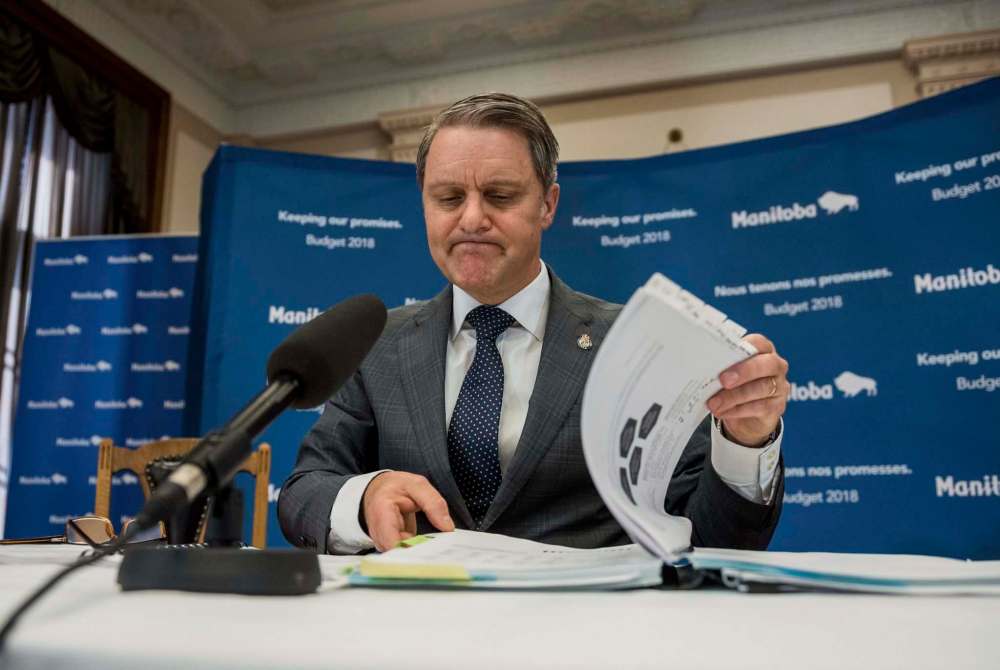Budget trickery won’t fool taxpayers
Advertisement
Read this article for free:
or
Already have an account? Log in here »
To continue reading, please subscribe:
Monthly Digital Subscription
$1 per week for 24 weeks*
- Enjoy unlimited reading on winnipegfreepress.com
- Read the E-Edition, our digital replica newspaper
- Access News Break, our award-winning app
- Play interactive puzzles
*Billed as $4.00 plus GST every four weeks. After 24 weeks, price increases to the regular rate of $19.00 plus GST every four weeks. Offer available to new and qualified returning subscribers only. Cancel any time.
Monthly Digital Subscription
$4.75/week*
- Enjoy unlimited reading on winnipegfreepress.com
- Read the E-Edition, our digital replica newspaper
- Access News Break, our award-winning app
- Play interactive puzzles
*Billed as $19 plus GST every four weeks. Cancel any time.
To continue reading, please subscribe:
Add Free Press access to your Brandon Sun subscription for only an additional
$1 for the first 4 weeks*
*Your next subscription payment will increase by $1.00 and you will be charged $16.99 plus GST for four weeks. After four weeks, your payment will increase to $23.99 plus GST every four weeks.
Read unlimited articles for free today:
or
Already have an account? Log in here »
Hey there, time traveller!
This article was published 14/03/2018 (2765 days ago), so information in it may no longer be current.
The Manitoba government is very concerned about Manitobans paying too much tax. It’s showing that concern in a rather unorthodox way. The Manitoba government is raising taxes.
“Manitobans face challenges of rising Hydro rates, increased federal and municipal taxes, and interest rates rising — they deserve a break,” said Finance Minister Cameron Friesen in his budget release. “With this budget — and the biggest tax cut in Manitoba’s history — we are giving them a break by taking money from the cabinet table and putting back on the kitchen table.”
This rhetoric is so thoroughly divorced from reality that even the most obvious lesson in arithmetic becomes a necessity.

So, let’s dig deep into the budget documents, to a page opaquely entitled “Fiscal Summary of Tax Measures.”
The carbon tax will cost Manitobans $143 million this fiscal year.
The sum of all of the other tax measures reduce taxes by $25.3 million.
Subtract $25.3 million from $143 million and the total tax burden on Manitoba will grow by $117.7 million this year.
The government also resorts to tangles of timing to paper over its nonsense. It argues that over time, taxpayers will come out ahead. The carbon tax will raise gas prices by 5.3 cents per litre on Sept. 1, and tax relief provided by increases to the basic personal exemption won’t kick in until Jan. 1, 2019. But, over the next few years, the government says taxpayers will come out ahead.
That’s a tough pitch at the best of times: “Give us your money; we’ll take good care of it in government coffers and, in time, we’ll make it up to you.” It’s the kind of proposition that suggests Manitoba’s government thinks taxpayers are suckers. But, once again, clarity can be found with a quick journey back to the Fiscal Summary of Tax Measures.
Over a full year, the carbon tax will cost taxpayers $248 million.
When fully implemented, the sum of all of the other tax measures reduces taxes by $152.7 million.
Subtract $152.7 million from $248 million and the total tax burden on Manitoba will grow by $95.3 million this year.
When cornered by opposition to the carbon tax, the Manitoba government generally offers a lame excuse: “Justin Trudeau made us do it.”
This, too, is nonsense.
The prime minister may have his faults, but this Manitoba government tax hike isn’t one of them.
Ottawa has been crystal clear that provincial governments have complete control of every penny they collect through a carbon tax. Provinces are free to provide tax relief that’s equal to the cost of a carbon tax. The Manitoba government’s failure to do that is the Manitoba government’s choice.
The timing issues are also attributable to the province. The province is choosing to impose the carbon tax on Sept. 1 and start to phase in personal income-tax cuts next year, but Ottawa isn’t asking provinces to impose carbon taxes until the end of this year. The province is choosing to raise taxes early while leaving the tax relief for later.
Even the apparent uses of the carbon tax revenues illuminate this government’s inexplicable choices. Government officials briefing stakeholders took pains to emphasize that carbon tax money isn’t linked to anything — not to tax relief or spending programs — instead, the carbon tax goes into general revenue and flows back out like every other dollar the government collects.
However, by apparent coincidence, the province is using $102 million to establish a conservation trust fund. Other than the amount of money that’s disappearing into this fund, there are virtually no other details about what it will accomplish. But if this vague fund is so urgently vital, the government could have reprioritized a fraction of its $17.4 billion in spending to cover the bill without sending it to taxpayers.
Taxpayers watch the money on their kitchen tables more closely than governments watch the money on the cabinet table — and they won’t be fooled by this budget.
Todd MacKay is the Prairie director of the Canadian Taxpayers Federation.





